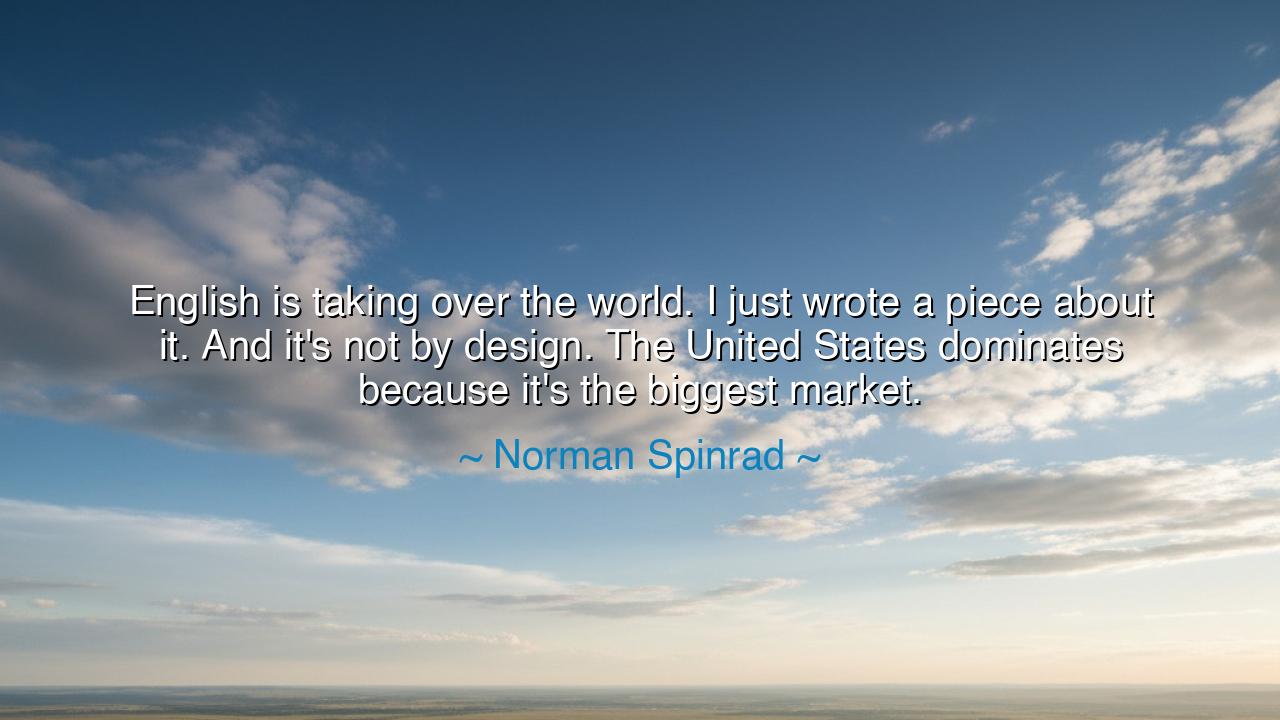
English is taking over the world. I just wrote a piece about it.
English is taking over the world. I just wrote a piece about it. And it's not by design. The United States dominates because it's the biggest market.






“English is taking over the world. I just wrote a piece about it. And it’s not by design. The United States dominates because it’s the biggest market.” Thus spoke Norman Spinrad, the visionary of speculative worlds, whose words reveal not only an observation of language, but a reflection on power, culture, and the unseen tides that shape civilization. In this quote lies an ancient truth reborn in modern form—that dominance often rises not from deliberate conquest, but from influence, and that the tools of empire are not always armies and banners, but words.
In the ages past, it was the sword that conquered nations; now, it is language that conquers hearts and minds. What Spinrad saw—and spoke with a prophet’s calm—is that the spread of English across the earth was not crafted as a plan of domination, but grew like ivy upon the walls of commerce and culture. It was not the generals, but the merchants, the storytellers, and the artists who carried this tongue across oceans. In the vast empire of ideas, the United States became not merely a country, but a marketplace of voices, songs, and symbols—and in that marketplace, English became the common coin.
The ancients would have understood this transformation. For every empire has had its language of power. The Greeks gave the world their philosophy, and so Greek became the speech of reason. The Romans built roads of law, and their Latin became the tongue of governance and faith for a thousand years. So too, in our own time, America—through its films, its music, its machines, and its markets—has spread its influence not through decree, but through desire. Spinrad’s insight is that this expansion was not deliberate conquest, but the natural consequence of a culture whose creations touched every corner of the world.
Yet beneath his words lies both wonder and warning. For while English connects, it also absorbs. Every language carries within it a way of seeing—a soul, shaped by the land and the people who speak it. When one language rises above all others, the risk is not of unity, but of forgetfulness—that in gaining a common tongue, humanity may lose the diverse voices that give it color. Just as the great rivers enrich the lands they touch, but may also flood them, so too can the spread of one language bring both nourishment and erasure.
Consider the story of the Latin language, which once ruled across Europe under the Roman banner. When the empire fell, Latin remained as the speech of the church and the scholar, but the people who once spoke it began to shape it anew. It fractured and flourished into Italian, Spanish, French, and Portuguese—each carrying echoes of the old empire, yet reborn in its own way. This tale teaches us that even when a single language dominates, life has a way of transforming conquest into creation. So too, the rise of English may yet birth new forms of expression, new dialects, and new stories that belong not to one nation, but to all who speak them.
In this way, Spinrad’s quote is not merely a commentary on language—it is a reflection on the force of influence. The United States did not design its dominance as an empire of tongues, yet it became one by the sheer weight of its cultural gravity. The market—of ideas, of goods, of stories—became the battlefield, and English its banner. But such power brings responsibility. For if one language rules, its speakers must use it with humility and care, remembering that the true purpose of language is not to command, but to communicate, to bridge the distances between human souls.
So let the lesson be this: beware the unintentional empire, and wield your words wisely. Whether you speak English, Spanish, Swahili, or Mandarin, cherish the language of your ancestors, for in it lies the wisdom of their dreams. And when you speak the language of the world, speak it not as a conqueror, but as a guest—grateful for the gift of shared understanding. For as Norman Spinrad reminds us, the greatest power is not found in markets or nations, but in the voice itself—the eternal current that flows between minds, shaping the destiny of humanity one word at a time.
And thus we see that though English may rise as the common tongue of this age, it is not mastery of language that makes us great, but the spirit with which we use it—to create, to connect, and to remember that behind every word lies the heart of a people.






AAdministratorAdministrator
Welcome, honored guests. Please leave a comment, we will respond soon